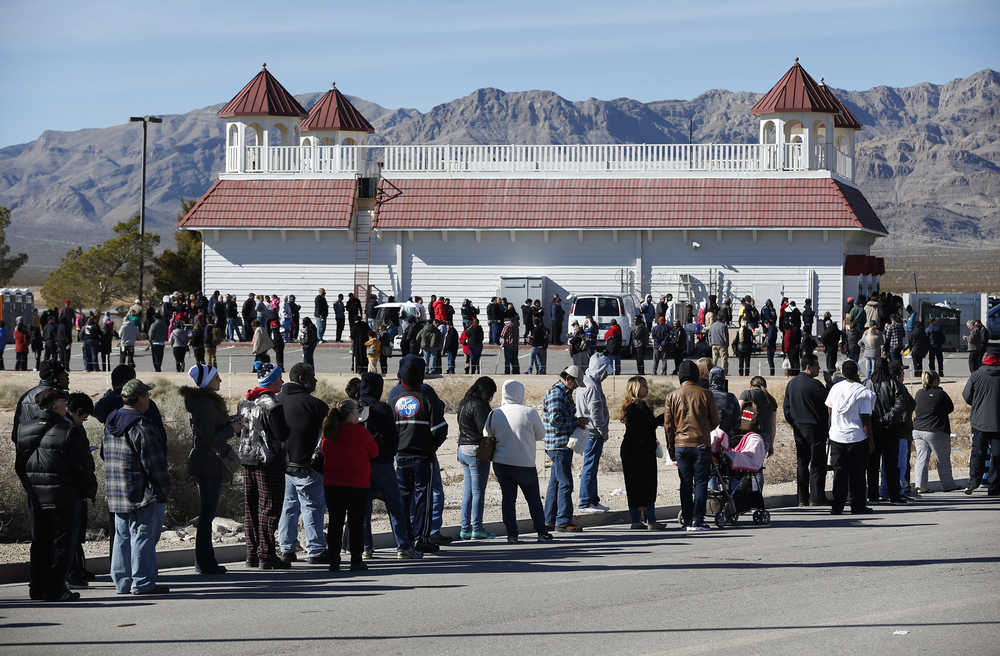NIPTON, Calif. — Lottery ticket buyers have to suspend their belief in math to drop $2 on an infinitesimal chance to win the Powerball jackpot, but in Nevada, they also have to drive across the desert and wait in lines that can stretch for hours.
In Hawaii and Alaska, they need to cross an ocean or mountains to reach a lottery kiosk.
As if the 1 in 292.2 million odds of winning weren’t inconvenient enough, people who live in the six states that don’t participate in Powerball must put in considerable extra effort to get a ticket.
With the giant jackpot on his mind, retiree William Burake drove 45 minutes Monday from his home in Henderson, Nevada, to buy tickets in Nipton, California. Then he waited three hours to spend $20 on 10 tickets at a store that is among the nation’s busiest lottery retailers.
“I thought maybe I’d be part of history,” said Burke, a Vietnam veteran who joined hundreds of people bundled in coats and scarfs before the doors opened at the Primm Valley Lotto Store off Interstate 15.
None of the six states has a lottery of any kind.
Religious beliefs have posed a barrier in Alabama, Mississippi and Utah. Alaska has been more concerned that a lottery wouldn’t pay off in such a sparsely populated state. In Hawaii, lawmakers have proposed lottery measures, but the idea always fails. And in Nevada, the lottery snub is largely a nod to the state’s casinos, which have no interest in the competition.
The Multi-State Lottery Association, which runs Powerball, reports that some of the biggest ticket sales come from border cities. That means residents of one state are driving to another to play Powerball, then probably spending a bit more on gas, soda or doughnuts.
“What that means for policymakers, that’s their business,” said Gary Grief, executive director of the Texas Lottery. “I’m sure they’re watching those dollars flow out of their state.”
In Alabama, people have been talking about instituting a lottery for years, in part because of sales in border states. Faced with tight state budgets and demands from voters, Republicans and Democrats on Tuesday introduced rival lottery bills for the legislative session that begins in February.
Republican state Sen. Jim McClendon, one of the bill sponsors, said he was considering the idea long before this month’s Powerball mania. The jackpot offers “fortuitous” timing, he said, and highlights the huge number of Alabama residents who are buying tickets elsewhere.
The people who are driving to surrounding states for tickets “cannot understand why Alabama doesn’t offer what 44 other states in America offer.”
Mississippi state Rep. Alyce Clarke, a Democrat from Jackson, has repeatedly sponsored a lottery bill, but she said religious opposition always kills the idea. That could change this year because of Powerball, she explained, enabling the state to raise money to subsidize colleges or fix roads and bridges.
Other states seem less likely to adopt lotteries.
In Utah, people have been crowding gas stations to buy tickets along the border with Wyoming and Idaho, but the state constitution bans all forms of gambling. Given that most legislators belong to the Church of Jesus Christ of Latter-day Saints, which opposes gambling, a change in the constitution is unlikely.
Alaska has seen only minimal interest in creating a lottery. The state Revenue Department has studied the option as a way to ease a budget deficit, but neither the governor nor legislators has made a formal proposal.
An agency report found that given Alaska’s vast land area and small population, a lottery would probably not generate as much money as in other states. And games such as Powerball could hurt state-regulated charitable gambling, which supports numerous nonprofits.
Alaska’s stand was still puzzling to Stacy Castle, a baker at Alaska Coffee Roasting Company in Fairbanks.
“I honestly don’t know why we don’t have one,” said Castle, explaining that she has friends in Oregon who are buying her Powerball tickets this week. “I’ve lived here for 20 years. It should be a choice for people in the state.”
___
McFetridge reported from Des Moines, Iowa.
___
Associated Press writers Becky Bohrer in Juneau, Alaska; Kimberly Chandler in Montgomery, Alabama; Jennifer Kelleher in Honolulu; Aleksandra Vujicic in Des Moines, Iowa; and Lindsay Whitehurst in Salt Lake City contributed to this story.
___
Follow Scott McFetridge at: https://twitter.com/smcfetridge .

